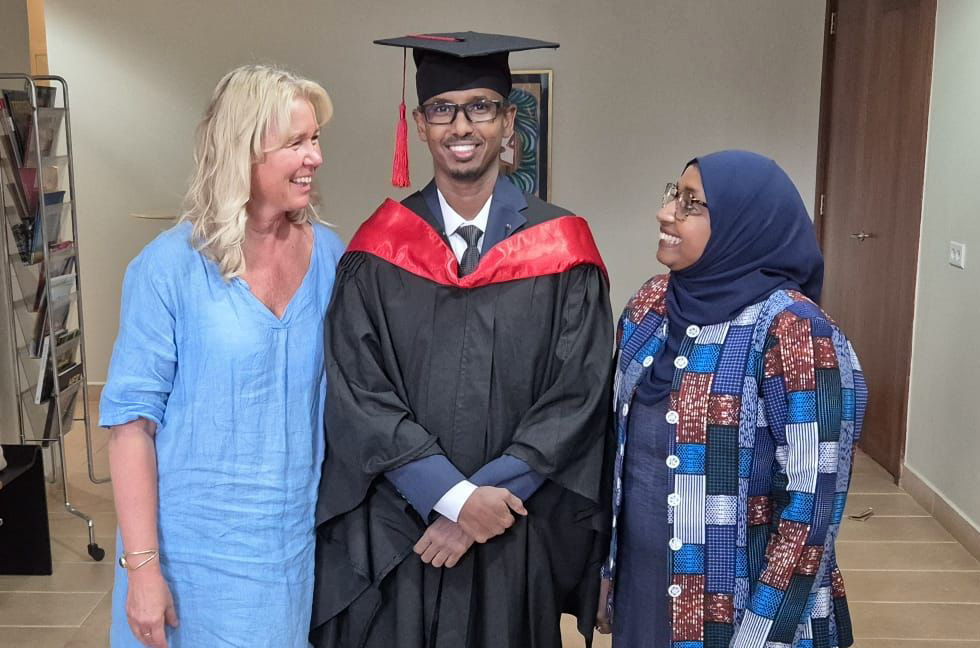
Mohamed is the third PhD graduate from the collaboration between Dalarna University and universities in Somalia and Somaliland, a partnership that continues to build vital research capacity.
– This research is dedicated to Somali children living in displacement, whose resilience and hope despite adversity inspired this work. It emphasizes that improving nutrition in fragile contexts is not only about survival, but also about ensuring that children have the chance to grow, learn, and achieve their potential, he says.
Tell us a bit about yourself, who are you?
– My name is Mohamed Kalid Ali, from Somalia. Over the years, I have worked with international organizations such as Save the Children and the Food and Agriculture Organization of the United Nations (FAO), focusing on health, nutrition, food security, and resilience. These professional experiences, together with my personal encounters with vulnerable communities, inspired me to pursue doctoral studies at Dalarna University.
What is your thesis about?
– My dissertation focuses on undernutrition and food security among children living in internally displaced person (IDP) camps in Somalia. It examines the prevalence of undernutrition, identifies risk and protective factors, and evaluates the effects of interventions such as nutrition counselling and unconditional cash transfers on child growth and household food security.
How have you conducted your studies?
– The research was carried out in three IDP camps in the Baidoa district of Bay region, Dayniile, and Dharkanley of Benadir region in Somalia. It included surveys with 1,655 caregivers and 2,370 children aged 6–59 months, anthropometric measurements to assess nutritional status, food security assessments, and structured household observations. A quasi-experimental design was used to evaluate the impact of nutrition counselling alone, and in combination with unconditional cash transfers on children’s nutrition and household food security.
What have you found?
– The studies revealed very high levels of undernutrition: 24.5% of children were underweight, 10.9% were wasted, 38.3% were stunted, and 4.1% suffered from both wasting and stunting (WaSt). While most households had adequate dietary diversity, less than half of the children consumed a sufficiently varied diet. Risk factors included poor maternal health, lack of antenatal care, food insecurity, and poor hygiene. Protective factors included timely complementary feeding, maternal involvement in decision-making, and stronger household food security.
What is the most significant finding?
–The most significant finding is that undernutrition and food insecurity in IDP camps are driven by multiple interconnected factors. The study showed that cash transfers and nutrition counselling, when implemented alone, did not lead to significant improvements in children’s growth or household food security. This demonstrates that undernutrition in displaced settings is highly complex and requires integrated, long-term solutions addressing feeding practices, maternal education, hygiene, and broader structural challenges.
Does your research have connections to education and collaboration at Dalarna University?
– Yes. This dissertation is part of the Care Sciences doctoral programme at Dalarna University and reflects the university’s strong commitment to maternal and child health. The research benefited greatly from the academic guidance and collaboration of supervisors and colleagues at Dalarna. Importantly, the study has also strengthened Dalarna University’s engagement with international contexts, as the academics involved are now familiar with the realities of undernutrition and food security in Somalia’s conflict and displacement settings. This opens opportunities for Dalarna University to continue building international collaborations, contributing knowledge, and supporting capacity development in fragile and humanitarian contexts.
What can we learn from your research?
– The research is important because it provides evidence to improve nutrition and food security programmes in fragile and conflict-affected settings. It shows that effective solutions require more than emergency food and cash assistance and must include maternal empowerment, improved feeding practices, hygiene, and better child dietary diversity. The findings can guide policymakers, humanitarian agencies, and development partners in Somalia and other countries facing similar challenges.
Why did you want to start researching? And why did you choose to research here at Dalarna University?
– My decision to start researching was driven by a personal encounter in an IDP camp in Baidoa, where I saw first-hand the devastating effects of child malnutrition. This experience shaped my determination to find sustainable solutions for children’s health and nutrition. I chose Dalarna University because of its strong international outlook on maternal and midwifery programmes, and expertise in care sciences. My connection with Dalarna University began earlier, through our collaboration at East Africa University, when Dalarna University and the Swedish International Development Agency (SIDA) supported the Master’s Programme in Reproductive Health and Rights. That initial partnership inspired me to continue my academic journey here.
What will you do now?
– I plan to continue working at the intersection of research, policy, and humanitarian action in the areas of nutrition, food security, and cash transfers. I also intend to publish further from my dissertation and contribute to initiatives that improve the lives of children and families in Somalia and beyond.
What are the target audience for the results of your thesis?
– The results are relevant for policymakers, humanitarian organizations, and development agencies, as well as researchers working on nutrition and food security. Local health workers and practitioners in Somalia can also directly apply the findings to improve interventions in IDP camps.
Read the full doctoral thesis: Undernutrition and food security in children in internally displaced person camps : Prevalence, risk factors, and the impact of a cash transfer and nutrition counseling intervention